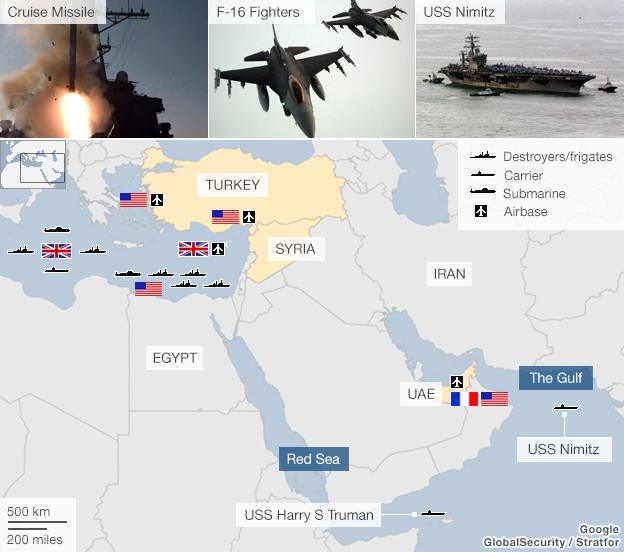US ready to launch Syria strike, says Chuck Hagel
- Published
US defence secretary Chuck Hagel says the US military is "ready to go" in responding to Syria
American forces are "ready" to launch strikes on Syria if President Barack Obama chooses to order an attack, US Defence Secretary Chuck Hagel says.
"We have moved assets in place to be able to fulfil and comply with whatever option the president wishes to take," Mr Hagel told the BBC.
The White House said the US would release intelligence on last week's suspected attack in the next few days.
The UK Parliament is to be recalled on Thursday to discuss possible responses.
Prime Minister David Cameron said the world could "not stand idly by" after seeing "appalling scenes of death and suffering" caused by suspected chemical weapons attacks.
The crisis follows last Wednesday's suspected chemical attack near the Syrian capital, Damascus, which reportedly killed more than 300 people.
US Vice President Joe Biden said there was "no doubt who was responsible for this heinous use of chemical weapons in Syria: The Syrian regime".
In a speech to a veterans' group in Houston, Mr Biden said that "those who use chemical weapons against defenceless men, women, and children... must be held accountable".
French President Francois Hollande said France was "ready to punish" whoever was behind the attack, and had decided to increase military support for Syria's main opposition.
BBC diplomatic correspondent James Robbins says the US, UK and France will now have the larger task of building as wide a coalition as possible to support limited military action.
Meanwhile the Arab League said it held Syrian President Bashar al-Assad responsible for the attacks and called for UN action.
Syrian opposition sources have said they have been told to expect a Western intervention in the conflict imminently.
"There is no precise timing... but one can speak of an imminent international intervention against the regime. It's a question of days and not weeks," AFP news agency quoted Syrian National Coalition official Ahmad Ramadan as saying.
"There have been meetings between the Coalition, the [rebel] Free Syrian Army and allied countries during which possible targets have been discussed."
Russia and China, allies of the Syrian government, have stepped up their warnings against military intervention, with Moscow saying any such action would have "catastrophic consequences" for the region.
Syrian Foreign Minister Walid Muallem has said he rejects "utterly and completely" claims that Syrian forces used chemical weapons, and his government has blamed rebel fighters.
On Monday, United Nations weapons inspectors were fired on while investigating one of the five alleged chemical weapons attack sites around Damascus.
'We are prepared'
Mr Hagel said the US Department of Defense had provided President Obama with "all options for all contingencies".
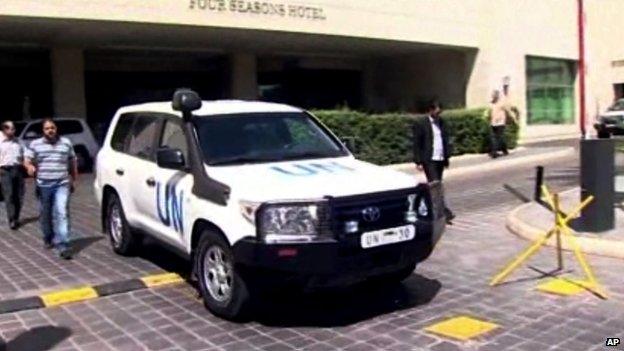
The head of the UN chemical inspectors team, Ake Sellstrom, and the UN's disarmament chief, Angela Kane, left their hotel in Damascus on Tuesday.
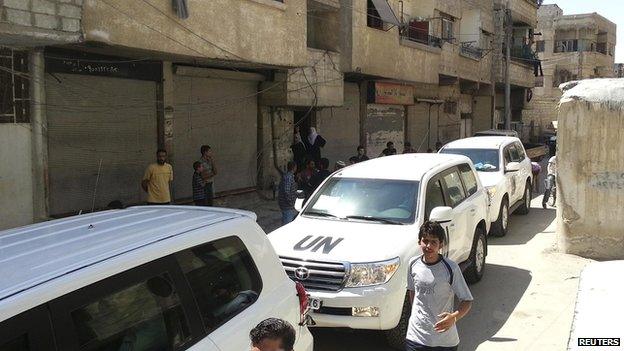
UN chemical weapons inspectors spent nearly three hours in the suburb of Muadhamiya in western Damascus on Monday.
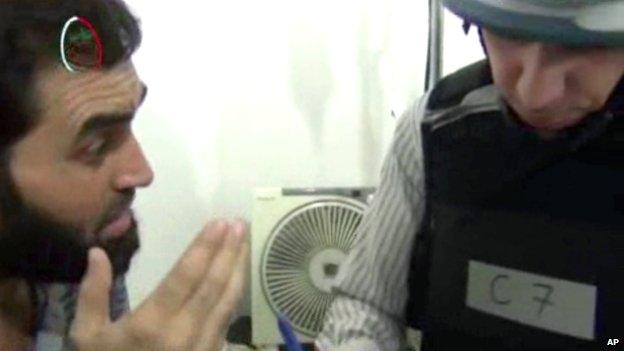
The inspectors visited two hospitals and interviewed survivors, eyewitnesses and doctors over last week's suspected chemical attack near the Syrian capital.
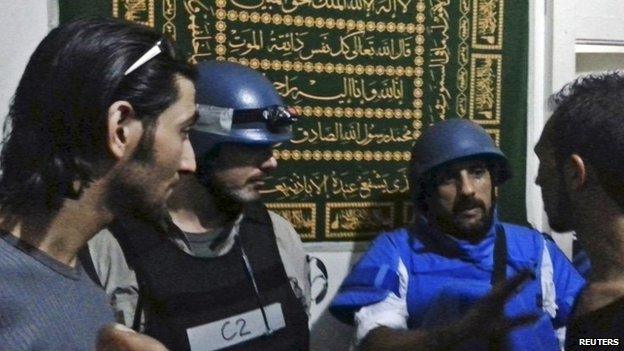
The inspectors were seen speaking to residents of Muadhamiya.
"He has seen them, we are prepared," he told the BBC's Jon Sopel, adding: "We are ready to go."
Jay Carney says the US is weighing an "appropriate response" to the alleged use of chemical weapons in Syria
Mr Hagel said that intelligence currently being gathered by the UN inspectors would confirm that the Syrian government was responsible for the chemical attack last week.
"I think it's pretty clear that chemical weapons were used against people in Syria," he said.
Our correspondent says Mr Hagel left little doubt that he believed the Assad government was responsible, and was ready to execute the orders of his commander-in-chief.
White House spokesman Jay Carney later said that a separate report on chemical weapons use being compiled by the US intelligence community would be published this week.
Mr Carney said that Mr Obama had a variety of options and was not limited to the use of force, adding that it was not Washington's intention to remove Mr Assad.
"The options we are considering are not about regime change," he said.
Meanwhile, warnings have been issued on sites linked to Islamist militants fighting for the rebels in Syria, saying that their leaders and training camps might also be targeted by a possible US-led attack, says BBC Arab affairs editor Sebastian Usher.
Several online sites linked to the Nusra Front and similar groups have advised militants not to hold meetings or gather in large numbers, and to change routines and locations, he says.
Western powers have made clear their distrust and dislike of groups like the Nusra Front, which have spearheaded rebel victories, although there has been no indication from the US or anyone else that jihadists would be targeted, he adds.
The UN says more than 100,000 people have been killed since the uprising against President Assad began more than two years ago. The conflict has produced more than 1.7 million registered refugees.
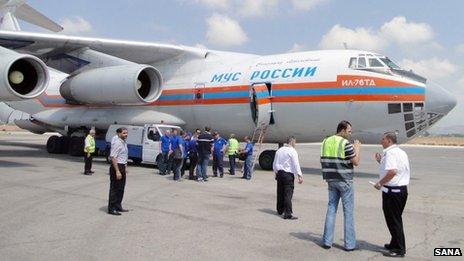
Syrian and Russian media said a cargo plane arrived in Latakia to evacuate Russian citizens
Earlier on Tuesday, a Russian transport plane landed in the Syrian city of Latakia with a cargo of humanitarian aid.
The aircraft later left with dozens of Russian citizens on board, an official spokeswoman for the Russian Emergencies Ministry, Irina Rossius, told Russian news agencies.
The flight was intended to evacuate Russians who wanted to leave Syria, she added.
